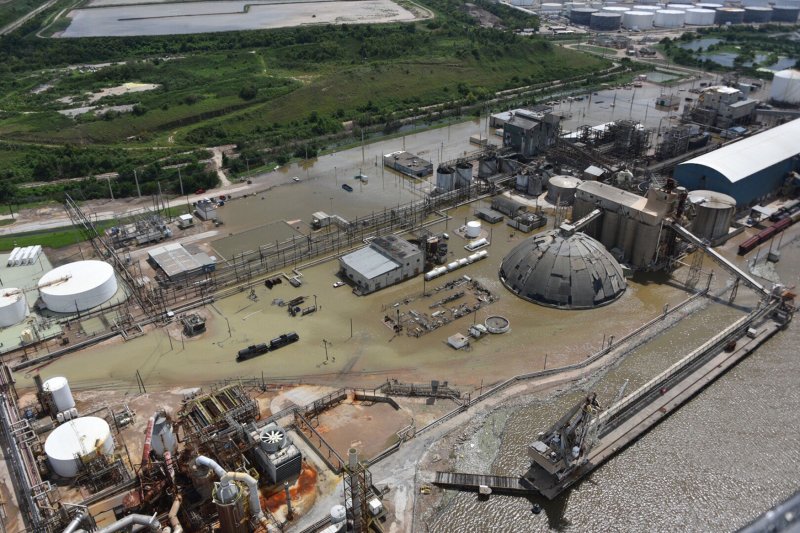OPEC's secretary general on Tuesday expressed solidarity with members of the Gulf Coast community impacted by Hurricane Harvey. Photo by PO1 Patrick Kelley/U.S. Coast Guard/UPI |
License Photo
Sept. 5 (UPI) -- Hurricane Harvey hit the United States after two years of oil sector declines and OPEC is ready to ensure the market is stable, its secretary general said.
Parts of the U.S. oil and gas sector were sidelined by the impact of the first major hurricane to hit Texas in about a decade. In its latest update, the U.S. Department of Energy said eight refineries in the region were in the process of restarting.
As of 3 p.m. EDT, Thursday, the Energy Department said there were 10 refineries closed in the Gulf Coast region, representing about 16.6 percent of the total U.S. refining capacity. The latest federal report added that four refineries were operating at reduced rates.
Some production centers, meanwhile, were shut in by the storm, with the Eagle Ford shale basin in Texas at one point directly in Harvey's path. A handful of offshore platforms were shut down, but the International Energy Agency said last week no extraordinary action was needed because the U.S. government's response was adequate.
Sanusi Barkindo, the secretary general of the Organization of Petroleum Exporting Countries, said in a letter to U.S. Energy Secretary Rick Perry the production group was standing in solidarity with the Gulf Coast community. He said OPEC will ensure the market remains stable and mitigate any current or future disruptions to the supply of oil.
"Hurricane Harvey comes after two years of contraction in the oil market and lagging investment in the oil industry, which is a great concern to all stakeholders," his letter read. "OPEC is committed to working together with others for the stability and security of the oil market, which is so important for sustained economic growth and the advancement of global prosperity."
OPEC is working to draw the level of global crude oil supplies closer to the five-year average through coordinated production declines. That effort, which began in January, has led to some stability for oil prices, which still remain about 50 percent lower than three years ago.
Total U.S. imports for the week ending Aug. 25, just as Harvey was headed to the Texas coast, were down 4.6 percent from the four-week moving average. Canada is the largest oil exporter to the United States, followed by Saudi Arabia. The four-week average for Saudi imports is down 37.3 percent, while Canada's are up 3.7 percent. The results from OPEC members are mixed, though mostly higher apart from Saudi Arabia.
Arab members of OPEC in the 1970s stopped shipping oil to the United States to protest policies on Israel and the IEA last took extraordinary action at the start of the decade in response to the Middle East and North African uprisings known collectively as the Arab Spring. An emailed report from S&P Global Platts said the United States could be a net oil exporter by 2023, which could influence the U.S. position in the world in terms of military commitments in the Middle East.















